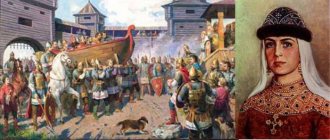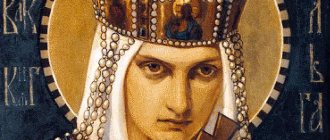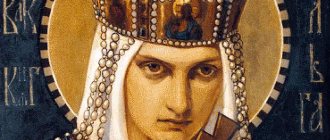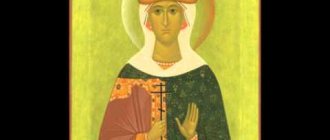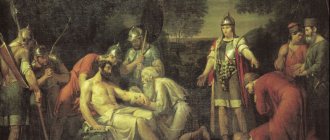| Holy Equal-to-the-Apostles Princess Olga |
Olga
, baptized
Elena
(+ 969), princess, holy, blessed, equal to the apostles Commemorated on July 11, in the Cathedrals of Volyn, Kiev and Pskov saints
Many assumptions have been made about its origin. The initial chronicle only mentions that Oleg brought Igor his wife Olga from Pleskov (Pskov?) in 903. Based on the news of one later chronicle, Pleskov was identified with the Bulgarian city of Pliskova and Olga was considered a Bulgarian princess; but this assumption, although it explains many facts of ancient Russian history, cannot be considered proven.
According to the Joachim Chronicle, she belonged to the family of the Izborsky princes - one of the ancient Russian princely dynasties. Her name was Varangian Helga
, in Russian pronunciation - Olga (Volga).
| Tsar Constantine VII Porphyrogenitus and Princess Olga in 955 at the Constantinople Hippodrome. Fresco of the Kyiv St. Sophia Cathedral (XI century) |
Tradition calls the village of Vybuty, not far from Pskov, up the Velikaya River, Olga’s birthplace.
The life of Saint Olga tells that here she first met her future husband. The young Prince Igor was hunting “in the Pskov region” and, wanting to cross the Velikaya River, he saw “someone floating in a boat” and called him to the shore. Sailing away from the shore in a boat, the prince discovered that he was being carried by a girl of amazing beauty. Igor was inflamed with lust for her and began to incline her to sin. The carrier turned out to be not only beautiful, but chaste and smart. She shamed Igor by reminding him of the princely dignity of a ruler and judge, who should be a “bright example of good deeds” for his subjects. Igor broke up with her, keeping her words and beautiful image in his memory. When the time came to choose a bride, the most beautiful girls of the principality were gathered in Kyiv. But none of them pleased him. And then he remembered Olga, “wonderful in maidens,” and sent his relative Prince Oleg for her. So Olga became the wife of Prince Igor, the Grand Duchess of Russia. After his marriage, Igor went on a campaign against the Greeks, and returned from it as a father: his son Svyatoslav was born. Soon Igor was killed by the Drevlyans. Olga began to rule the Kyiv land for her young son Svyatoslav.
Fearing revenge for the murder of the Kyiv prince, the Drevlyans sent ambassadors to Princess Olga, inviting her to marry their ruler Mal. Olga pretended to agree. By cunning she lured two embassies of the Drevlyans to Kyiv, putting them to a painful death: the first was buried alive “in the princely courtyard,” the second was burned in a bathhouse. After this, five thousand Drevlyan men were killed by Olga’s soldiers at a funeral feast for Igor at the walls of the Drevlyan capital Iskorosten. The next year, Olga again approached Iskorosten with an army. The city was burned with the help of birds, to whose feet burning tow was tied. The surviving Drevlyans were captured and sold into slavery.
The chronicles are full of evidence of her tireless “walks” across the Russian land in order to build the political and economic life of the country. She achieved the strengthening of the power of the Kyiv Grand Duke and centralized public administration through a system of “pogosts” (administrative centers). The chronicle notes that she, her son and her retinue, walked through the Drevlyansky land, “establishing tributes and quitrents,” noting villages and camps and hunting grounds to be included in the Kyiv grand-ducal possessions. She went to Novgorod, setting up graveyards along the Msta and Luga rivers. “Hunting places for her (hunting places) were all over the earth, signs were installed, places for her and graveyards,” writes the chronicler, “and her sleigh stands in Pskov to this day, there are places indicated by her for catching birds along the Dnieper and along the Desna; and her village Olgichi still exists today.” Pogosts (from the word “guest” - merchant) became the support of the grand ducal power, centers of ethnic and cultural unification of the Russian people.
| St. blgv. Princess Olga. Fresco in the Archangel Cathedral of the Moscow Kremlin (XVII century) |
The Life tells the following about Olga’s labors: “And Princess Olga ruled the regions of the Russian land under her control not as a woman, but as a strong and reasonable husband, firmly holding power in her hands and courageously defending herself from enemies.
And she was terrible for the latter. She is loved by her people as a merciful and pious ruler, as a righteous judge who does not offend anyone, inflicts punishment with mercy and rewards the good; She instilled fear in all evil, rewarding each in proportion to the merit of his actions, but in all matters of government she showed foresight and wisdom. At the same time, Olga, merciful at heart, was generous to the poor, the poor and the needy; fair requests soon reached her heart, and she quickly fulfilled them... With all this, Olga combined a temperate and chaste life; she did not want to remarry, but remained in pure widowhood, observing princely power for her son until the days of his age. When the latter matured, she handed over to him all the affairs of the government, and she herself, having withdrawn from rumors and care, lived outside the concerns of management, indulging in works of charity.” Rus' grew and strengthened. Cities were built surrounded by stone and oak walls. The princess herself lived behind the reliable walls of Vyshgorod, surrounded by a loyal squad. Two-thirds of the collected tribute, according to the chronicle, she gave to the Kyiv veche, the third part went “to Olga, to Vyshgorod” - to the military building. The establishment of the first state borders of Kievan Rus dates back to Olga's time. The heroic outposts, sung in epics, guarded the peaceful life of the people of Kiev from the nomads of the Great Steppe and from attacks from the West. Foreigners flocked to Gardarika
(“the country of cities”), as they called Rus', with goods. The Scandinavians and Germans willingly joined the Russian army as mercenaries. Rus' became a great power.
The author of the “Book of Degrees” writes: “Her feat was that she recognized the true God. Not knowing the Christian law, she lived a pure and chaste life, and she wanted to be a Christian by free will, with the eyes of her heart she found the path of knowing God and followed it without hesitation.”
The Venerable Nestor the Chronicler narrates: “Blessed Olga from an early age sought wisdom, which is the best in this world, and found a pearl of great value—Christ.”
In 955, according to the chronicle, Princess Olga went to Constantinople, where she was baptized; but the Greek emperor Constantine Porphyrogenitus talks about Olga’s stay in Constantinople in 957 and does not mention her baptism there at all. Probably Olga was baptized before her trip to Constantinople, in Kyiv, where there were already many Varangian Christians then.
Olga returned to Kyiv with icons and liturgical books—her apostolic service began. She erected a temple in the name of St. Nicholas over the grave of Askold, the first Christian prince of Kyiv, and converted many Kiev residents to Christ. The princess set off to the north to preach the faith. In the Kyiv and Pskov lands, in remote villages, at crossroads, she erected crosses, destroying pagan idols.
| St. Olga, Princess of Russia. Greek icon |
According to the (dubious) news of Western chroniclers, in 959 Olga sent an embassy to the German king Otto I with a request to send a bishop and priests, which was done, but the sent bishop had to return with nothing.
On May 11, 960, the Church of St. Sophia, the Wisdom of God, was consecrated in Kyiv [1]. This day was celebrated in the Russian Church as a special holiday. The main shrine of the temple was the cross that Olga received at baptism in Constantinople. After the conquest of Kyiv by the Lithuanians, Holga's cross was stolen from St. Sophia Cathedral and taken by Catholics to Lublin. His further fate is unknown.
The apostolic labors of the princess met secret and open resistance from the pagans. Among the boyars and warriors in Kyiv there were many people who, according to the chroniclers, “hated Wisdom,” like Saint Olga, who built temples for Her. The zealots of pagan antiquity raised their heads more and more boldly, looking with hope at the growing Svyatoslav, who decisively rejected his mother’s entreaties to accept Christianity. “The Tale of Bygone Years” tells about it this way: “Olga lived with her son Svyatoslav, and persuaded his mother to be baptized, but he neglected this and covered his ears; however, if someone wanted to be baptized, he did not forbid him, nor mocked him... Olga often said: “My son, I have come to know God and I rejoice; so you, if you know it, you will also begin to rejoice.” He, not listening to this, said: “How can I want to change my faith alone? My warriors will laugh at this!” She told him: “If you are baptized, everyone will do the same.” He, without listening to his mother, lived according to pagan customs, not knowing that if anyone does not listen to his mother, he will get into trouble, as it is said: “If anyone does not listen to his father or mother, he will suffer death.” He was also angry with his mother... But Olga loved her son Svyatoslav when she said: “God’s will be done. If God wants to have mercy on my descendants and the Russian land, let him command their hearts to turn to God, as it was granted to me.” And saying this, she prayed for her son and for his people all days and nights, taking care of her son until he reached manhood.”
Despite the success of her trip to Constantinople, Olga was unable to persuade the emperor to agree on two important issues: on the dynastic marriage of Svyatoslav with the Byzantine princess and on the conditions for the restoration of the metropolis in Kyiv that existed under Askold. Therefore, Saint Olga turns her gaze to the West - the Church was united at that time. It is unlikely that the Russian princess could have known about the theological differences between the Greek and Latin doctrines.
In 959, a German chronicler writes: “ The ambassadors of Elena, queen of the Russians, who was baptized in Constantinople, came to the king and asked to consecrate a bishop and priests for this people
."
King Otto I, the future founder of the Holy Roman Empire of the German nation, responded to Olga's request. A year later, Libutius was installed as Bishop of Russia, but he soon died and in 961, Adalbert of Trier was consecrated in his place, whom Otto, “ generously providing everything necessary
,” sent to Russia.
When Adalbert appeared in Kiev in 962, he “ did not succeed in anything for which he was sent, and saw his efforts in vain
.”
On the way back, “ some of his companions were killed, and the bishop himself did not escape mortal danger
” [2].
| St. Princess Olga. Sketch by M. V. Nesterov for the iconostasis of the southern chapel in the choir of the Kyiv Vladimir Cathedral (1892) |
The pagan reaction manifested itself so strongly that not only the German missionaries suffered, but also some of the Kyiv Christians who were baptized along with Olga.
By order of Svyatoslav, Olga's nephew Gleb was killed and some of the temples she built were destroyed. Saint Olga had to come to terms with what had happened and go into matters of personal piety, leaving control to the pagan Svyatoslav. Of course, she was still taken into account, her experience and wisdom were invariably turned to on all important occasions. When Svyatoslav left Kyiv, the administration of the state was entrusted to Saint Olga. The glorious military victories of the Russian army were consolation for her. Svyatoslav defeated the longtime enemy of the Russian state - the Khazar Khaganate, forever crushing the power of the Jewish rulers of the Azov and lower Volga regions. The next blow was dealt to Volga Bulgaria, then it was the turn of Danube Bulgaria - eighty cities were taken by Kyiv warriors along the Danube. Svyatoslav and his warriors personified the heroic spirit of pagan Rus'. The chronicles have preserved the words of Svyatoslav, surrounded with his retinue by a huge Greek army: “We will not disgrace the Russian land, but we will lie with our bones here! The dead have no shame!” Svyatoslav dreamed of creating a huge Russian state from the Danube to the Volga, which would unite Rus' and other Slavic peoples. Saint Olga understood that with all the courage and bravery of the Russian squads, they could not cope with the ancient empire of the Romans, which would not allow the strengthening of pagan Rus'. But the son did not listen to his mother’s warnings. The son finally moved to Pereyaslavets-on-Danube. While in Kyiv, she taught her grandchildren, the children of Svyatoslav, the Christian faith, but did not dare to baptize them, fearing the wrath of her son. In addition, he hindered her attempts to establish Christianity in Rus'. In recent years, amid the triumph of paganism, she had to secretly keep a priest with her so as not to cause a new outbreak of anti-Christian sentiment.
| St. Grand Duchess Olga. An icon going back to the image painted by V. M. Vasnetsov for the iconostasis of the Kyiv Vladimir Cathedral |
In 968, Kyiv was besieged by the Pechenegs.
The holy princess and her grandchildren, among whom was Prince Vladimir, found themselves in mortal danger. When news of the siege reached Svyatoslav, he rushed to the rescue, and the Pechenegs were put to flight. Saint Olga, already seriously ill, asked her son not to leave until her death. She did not lose hope of turning her son’s heart to God and on her deathbed did not stop preaching: “Why are you leaving me, my son, and where are you going? When looking for someone else's, to whom do you entrust yours? After all, Your children are still small, and I am already old, and sick, - I expect an imminent death - departure to my beloved Christ, in whom I believe; Now I don’t worry about anything except about you: I regret that although I taught a lot and convinced you to leave the wickedness of idols, to believe in the true God, known to me, but you neglect this, and I know what for your disobedience A bad end awaits you on earth, and after death - eternal torment prepared for the pagans. Now fulfill at least this last request of mine: do not go anywhere until I am dead and buried; then go wherever you want. After my death, do not do anything that pagan custom requires in such cases; but let my presbyter and the clergy bury my body according to Christian custom; do not dare to pour a grave mound over me and hold funeral feasts; but send the gold to Constantinople to the Holy Patriarch, so that he may make a prayer and offering to God for my soul and distribute alms to the poor.”
Hearing this, Svyatoslav wept bitterly and promised to fulfill everything she had bequeathed, refusing only to accept the holy faith. After three days, blessed Olga fell into extreme exhaustion; she received communion and all the time remained in fervent prayer to God and to the Most Pure Mother of God, whom she always had as her helper according to God; she called upon all the saints; Blessed Olga prayed with special zeal for the enlightenment of the Russian land after her death; seeing the future, she repeatedly predicted that God would enlighten the people of the Russian land and many of them would be great saints; Blessed Olga prayed for the speedy fulfillment of this prophecy at her death.
On July 11, 969, Saint Olga died, “and her son and grandchildren and all the people cried for her with great lamentation.” Presbyter Gregory fulfilled her will exactly. After her glorification, her memory began to be revered throughout Rus' over time. The Moscow Council in 1547 confirmed the widespread veneration of her in Rus' even in the pre-Mongol era.
Reverence
| Blzh. Duchess Olga. Icon (Europe, XX-XXI centuries) |
God glorified the “leader” of faith in the Russian land with miracles and incorruption of relics.
Under Saint Prince Vladimir, the relics of Saint Olga were transferred to the Tithe Church of the Dormition of the Blessed Virgin Mary and placed in a sarcophagus, in which it was customary to place the relics of saints in the Orthodox East. “And you hear another miracle about her: a small stone coffin in the Church of the Holy Mother of God, that church was created by blessed Prince Vladimir, and there is the coffin of blessed Olga. And at the top of the coffin a window was created - so that you could see the body of blessed Olga lying intact. Whoever comes with faith, the window opens, and sees the honest body lying intact and marvels at such a miracle - the body has been lying in the coffin for so many years without being destroyed. That honest body is worthy of all praise: it is intact in the coffin, as if sleeping, resting. But for others who do not come with faith, the window of the tomb will not open, and they will not see that honest body, but only the tomb.”
For many centuries, Olga was called in the Church the “Holy Blessed Princess of Russia” (this name is still preserved in the liturgical books of the ROCOR). Only from the beginning of the 1980s, on the personal initiative of Archimandrite Innokenty (Prosvirnin) [3], in the Service Books (on July 11th in the month’s book and in the text of the prayer “Save, O God, thy people...”) they began to print: “Holy Equal-to-the-Apostles Grand Duchess of Russia” [4] (however, in the “green” Menea, for which Father Innocent also prepared services for Russian saints, the inscription of the service on July 11 is somewhat different: “The Repose of the Holy Blessed and Equal-to-the-Apostles Olga, Princess of Russia, named Helen in Holy Baptism” [5]) .
How did Princess Olga become the patron saint of Rus'?
Neither Olga's date of birth nor her ancestry are known. And the rest of the information about her is fragmentary and significantly legendary, so it is no longer possible to separate fiction from truth. This is not necessary, since the legends and traditions about her life reflect the great love and respect of the people for their ruler. Let the life story of Princess Olga remain the same as it was created by the people and recorded in the annals of the history of Rus'.
According to legend, Olga was born in the forests near Pskov into a simple family. She met her future husband, Prince Igor, by chance when, during a princely hunt, she transported him on her canoe across the river. Seeing a beautiful girl in his carrier, the prince decided to take possession of her, but Olga was able to stop the prince by force of persuasion, which made a great impression on him. When Igor decided to get married, he remembered the beautiful Olga, and she was brought to Kyiv.
Archontissa Olga, drawing from a book, 1869. Photo: ru.wikipedia.org
The marriage turned out to be happy. Olga became her husband's faithful assistant, decisively taking many of the reins of government into her own hands. It seems that Igor even liked this, who could calmly go on long military campaigns and collect tribute, knowing that in his absence his wife would maintain proper order in the principality.
From the next campaign for tribute, the warriors returned without the prince, who was killed by the Drevlyans. If you believe the chronicle, the prince died because of his desire to collect increased tribute from the Drevlyans. Realizing that a cruel retribution could follow from the strong Kyiv, the Drevlyans invited Olga to marry their prince. In those days, this was a common occurrence, so the Drevlyan ambassadors fell for the feminine trick, believing Olga that she was ready to accept their offer.
N.V. Omelchenko, “Princess Olga”, 2022. Photo: artchive.ru
The chronicle colorfully describes how the Drevlyan embassy, on the advice of Olga, demanded that he be carried to the princess in a boat in their arms.
“They sat, magnified, with their arms on their feet and wearing great breastplates. And they brought them to Olga’s courtyard, and as they carried them, they threw them along with the boat into a pit. And, bending towards the pit, Olga asked them: “Is honor good for you?” They answered: “Igor’s death is worse for us.” And she ordered them to be buried alive; and covered them up."
This didn’t seem enough to Olga; she demanded another embassy be sent to her, which she burned in the bathhouse.
Apparently, she wanted to take revenge on the Drevlyans thoroughly, since with a small retinue she went to their lands, where she performed a funeral feast for her husband. Then, having deceived the noble Drevlyans with an imaginary love of peace, she gave them wine to drink, and when
“The Drevlyans became drunk, she ordered her youths to drink in their honor, and she went far away and ordered the squad to cut down the Drevlyans, and cut 5,000 of them. And Olga returned to Kyiv and gathered an army against those who remained.”
Returning with a large squad, Olga approached the Drevlyan city of Iskorosten, near which her husband was killed. The chronicle tells how, having once again deceived the Drevlyans, Olga
“she took the city and burned it, took the city elders captive, and killed other people, and gave others into slavery to her husbands, and left the rest to pay tribute.”
On this campaign, the princess was accompanied by her young son Svyatoslav.
Having satisfied her thirst for revenge, Olga began to restore order in the country, establishing tribute and bringing the tribes to submission. By and large, it was under her that Rus' turned into a single powerful state. Under her rule, stone construction began in the country, borders with heroic outposts appeared, trade security was ensured, and foreign merchants flocked to Rus'.
I. A. Akimov, “Grand Duke Svyatoslav kissing his mother and children upon returning from the Danube to Kyiv,” 1773. Photo: artchive.ru
Next to the princess, the son grew up, gaining wisdom and preparing to become a great warrior, whose name would still strike fear not only in the neighbors of Rus', but also in distant countries.
In 955, Olga, leaving Rus' under the control of her son, went to Constantinople. The chronicle describes in detail her reception at the Byzantine Emperor Constantine Porphyrogenitus and her acceptance of baptism from Patriarch Theophylact, who taught her the basics of Christianity. At baptism, the princess received the Christian name Elena.
Apparently, her visit was not without problems, and Olga had to wait a long time in the suburbs of Constantinople to receive the emperor. This is evidenced by the response of the princess who returned to Kyiv to the emperor through the Byzantine ambassadors, who recalled her promise to send rich gifts to Constantinople:
“If you stand with me in Pochaina as much as I do in the Court, then I will give it to you.”
In Kyiv, Olga erected a temple in the name of St. Nicholas. Her attempts to baptize Rus' and persuade her son to accept Christianity were unsuccessful. It is curious that she invited priests to Rus' not from Byzantium, but from Europe. At her request, Bishop Libutius from Mainz first arrived in Rus', and after his death, Bishop Adalbert of Trier. Apparently, in Rus' they did not really delve into the contradictions that were increasingly intensifying between the Roman and Byzantine (Greek) branches of Christianity. It is worth noting that parishes subordinate to the Pope existed in Rus' until the time of Alexander Nevsky.
Even after handing over the reins of government of Russia to her son, Olga did not retreat from state affairs, continuing to rule during the frequent military campaigns of Svyatoslav, who sought to expand the borders of the country from the Danube to the Volga.
Svyatoslav Igorevich Photo: Sculptural image by Evgeniy Lanceray
In 969, feeling that the days of her life were ending, Olga kept her son with her, declaring: “When you bury me, go wherever you want.” Three days later, the princess died, mourned by her son, grandchildren and the entire Russian people.
After her death, the chronicler wrote amazingly emotional lines:
“She was the forerunner of the Christian land, like the day before the sun, like the dawn before the dawn. She shone like the moon in the night; so she shone among the pagans, like pearls in the mud; At that time people were polluted with sins, not washed by holy baptism.”
In 1547, Olga was canonized by the Russian Orthodox Church, becoming the only Equal-to-the-Apostles saint among canonized Russian women. Since that time, she has been considered the patron saint of the Russian land.
Tags: Princess Olga, Rus', Ancient Rus', history of Rus', patron saint, Orthodox Church
Prayers
Troparion, tone 1
With the wings of the God-mind, having fixed your mind,/ you flew above the visible creation,/ seeking God and the Creator of all things,/ and, having found Him, you received His birth through Baptism:/ the tree is alive hence you enjoy, // you remain incorruptible forever, Olgo, ever-glorious.
Troparion, tone 8
In you, God-wise Elena, / you know the image of salvation in the Russian country, / how, having received the bath of holy Baptism, / you followed Christ, / creating and teaching, even if you left the idolatry beauty,/ to take care of souls, things more immortal,/ Likewise, your spirit, Equal-to-the-Apostles, rejoices with the Angels.
Troparion, tone 4
Having abandoned the flattery of idols,/ you followed Christ, the Immortal Bridegroom,/ the God-Wise One,/ rejoicing in His devil, unceasingly praying// for those who honor the holy memory with faith and love fuck yours.
Introparion, Hellenic
(from the Menaion MP)
, tone 3
Holy Equal-to-the-Apostles to the chosen one of Christ,/ Princess Olgo,/ gave your people the verbal and pure milk of Christ to drink,/ praying to the Merciful God,/ that sins may be forgiven/ / will give to our souls.
Troparion
(from the Greek Menaion, translation by Natalia Bakhareva)
, voice 3
The holy beginning of the Divine faith/ you appeared in Russia,/ you came to the grace of Savior/ and brought your people to her,/ like a true queen and a host of God Naya./ Glorious Olgo,/ Pray to Christ God // grant us great mercy.
Kontakion, tone 4
Let us sing today to God, the Benefactor of all, / who glorified Olga the God-Wise in Russia, / so that through her prayers / he will grant remission of sins to our souls.
Kontakion, tone 4
Today the grace of God appears to all, / having glorified Olga the God-Wise in Russia, / with her prayers, O Lord, / / grant people remission of sin.
Greatness
We magnify you, / blessed and Equal-to-the-Apostles Princess Olgo, / and honor your holy memory, / who trampled idols, / and who enlightened many Russian people with holy Baptism.
Foreign greatness
We magnify you, / holy Equal-to-the-Apostles Princess Olgo, / like the morning dawn that rose in our land / and the light of the Orthodox faith / who foretold to her people.
Literature
- About the origin of Olga
- arch. Leonidas, “Where did St. come from? Grand Duchess Olga of Russia? (“Russian Starina”, 1888, book 7)
- I. I. Malyshevsky, “The origin of the Russian Grand Duchess Olga St.” (“Kyiv Starina”, 1889, 7 and 8 et seq.).
- prose (see “Readings in the historical community of Nestor let.,” II, and Macarius, “History of the Russian Church”),
- in Chetya-Minea Macarius and in the Book of Degrees,
Advantages and disadvantages
Achievements and successes
- The uprising of the Drevlyans was suppressed (946).
- The first administrative and tax reform in Rus' was carried out (947).
The lands subject to Kyiv were divided into administrative units - graveyards, in each of which a princely administrator - tiun - was appointed; collection of tribute (lessons) was introduced; the amounts of “polyudya” - taxes in favor of Kyiv, the terms and frequency of their payment - “rents” and “charters” were established. The streamlining of taxation established internal peace in the country for a long time. - According to the chronicle and other sources, in Olga’s era there were 30 years without civil strife and uprisings
(947-977),
about 30 years without invasions
(939-968),
20 years without external wars
(944-964), thanks to which
the economy flourished and trade
_ - Novgorod, Pskov and Rostov were built on modern sites and became major urban centers
after the reform of 947. - The beginning of stone construction in Russia was laid
(the first stone buildings in Kiev were the city palace and Olga’s country tower). - The first official foreign visit of the ruler of Russia
was made - Olga's trip to Constantinople, the capital of Byzantium (955 or 957),
diplomatic relations were established with Byzantium
(Roman Empire)
and Germany
(Holy Roman Empire) (959).[3] - The first woman and the first Christian among Russian rulers
(baptized in 955 or 957),
the first Russian saint
(one of 6 women in history recognized as early apostolic saints). - Olga’s last major achievement in her lifetime can be considered the successfully withstood siege of the Pechenegs in Kyiv during their first raid on Rus' in 968, when one young Kiev resident managed to get through the enemy camp and call for help from the other bank of the Dnieper. This happened already during the independent reign of Svyatoslav Igorevich.
Mistakes and failures
- The uprising of the Drevlyans was suppressed with legendary cruelty, described in the chronicles (during this period, Olga was still a pagan and was extremely dependent on the predominantly pagan princely army).
- Olga was unable to persuade her son Svyatoslav to accept Christianity, which is why her plans to Christianize Rus' were thwarted (the mission of Bishop Adalbert from the Holy Roman Empire, which she called in 959, was forced to go home in 962; on the other hand, this ultimately strengthened the leading the role of Eastern rather than Western Christianity in Rus'); soon after this, Svyatoslav began to rule independently, and after the death of his mother, according to the controversial Joachim Chronicle, during and after the war with Byzantium, he launched a persecution of Christians and killed his Christian brother Uleb (the youngest son of Olga or the son of Igor from another wife).[ 2]
